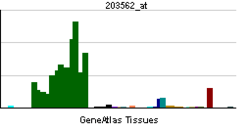FEZ1
| View/Edit Human | View/Edit Mouse |
Fasciculation and elongation protein zeta-1 is a protein that in humans is encoded by the FEZ1 gene.[3][4][5]
This gene is an ortholog of the C. elegans unc-76 gene, which is necessary for normal axonal bundling and elongation within axon bundles. Expression of this gene in C. elegans unc-76 mutants can restore to the mutants partial locomotion and axonal fasciculation, suggesting that it also functions in axonal outgrowth. The N-terminal half of the gene product is highly acidic. Alternatively spliced transcript variants encoding different isoforms of this protein have been described.[5]
This protein is present in neurons, and it is believed to block the process of infection of these cells by HIV.[6]
Interactions
FEZ1 has been shown to interact with Protein kinase Mζ,[7] NBR1[8] and DISC1.[9]
References
- ↑ "Human PubMed Reference:".
- ↑ "Mouse PubMed Reference:".
- ↑ Bloom L, Horvitz HR (May 1997). "The Caenorhabditis elegans gene unc-76 and its human homologs define a new gene family involved in axonal outgrowth and fasciculation". Proc Natl Acad Sci U S A. 94 (7): 3414–9. Bibcode:1997PNAS...94.3414B. doi:10.1073/pnas.94.7.3414. PMC 20384
 . PMID 9096408.
. PMID 9096408. - ↑ Suzuki T, Okada Y, Semba S, Orba Y, Yamanouchi S, Endo S, Tanaka S, Fujita T, Kuroda S, Nagashima K, Sawa H (Jun 2005). "Identification of FEZ1 as a protein that interacts with JC virus agnoprotein and microtubules: role of agnoprotein-induced dissociation of FEZ1 from microtubules in viral propagation". J Biol Chem. 280 (26): 24948–56. doi:10.1074/jbc.M411499200. PMID 15843383.
- 1 2 "Entrez Gene: FEZ1 fasciculation and elongation protein zeta 1 (zygin I)".
- ↑ Haedicke, J.; Brown, C.; Naghavi, M. H. (Aug 2009). "The brain-specific factor FEZ1 is a determinant of neuronal susceptibility to HIV-1 infection". Proceedings of the National Academy of Sciences. 106 (33): 14040–14045. Bibcode:2009PNAS..10614040H. doi:10.1073/pnas.0900502106. ISSN 0027-8424. PMC 2729016
 . PMID 19667186.
. PMID 19667186. - ↑ Kuroda, S; Nakagawa N; Tokunaga C; Tatematsu K; Tanizawa K (Feb 1999). "Mammalian homologue of the Caenorhabditis elegans UNC-76 protein involved in axonal outgrowth is a protein kinase C zeta-interacting protein". J. Cell Biol. UNITED STATES. 144 (3): 403–11. doi:10.1083/jcb.144.3.403. ISSN 0021-9525. PMC 2132904
 . PMID 9971736.
. PMID 9971736. - ↑ Whitehouse, Caroline; Chambers Julie; Howe Kathy; Cobourne Martyn; Sharpe Paul; Solomon Ellen (Jan 2002). "NBR1 interacts with fasciculation and elongation protein zeta-1 (FEZ1) and calcium and integrin binding protein (CIB) and shows developmentally restricted expression in the neural tube". Eur. J. Biochem. Germany. 269 (2): 538–45. doi:10.1046/j.0014-2956.2001.02681.x. ISSN 0014-2956. PMID 11856312.
- ↑ Miyoshi, K; Honda A; Baba K; Taniguchi M; Oono K; Fujita T; Kuroda S; Katayama T; Tohyama M (Jul 2003). "Disrupted-In-Schizophrenia 1, a candidate gene for schizophrenia, participates in neurite outgrowth". Mol. Psychiatry. England. 8 (7): 685–94. doi:10.1038/sj.mp.4001352. ISSN 1359-4184. PMID 12874605.
Further reading
- Kuroda S, Nakagawa N, Tokunaga C, et al. (1999). "Mammalian homologue of the Caenorhabditis elegans UNC-76 protein involved in axonal outgrowth is a protein kinase C zeta-interacting protein.". J. Cell Biol. 144 (3): 403–11. doi:10.1083/jcb.144.3.403. PMC 2132904
 . PMID 9971736.
. PMID 9971736. - Whitehouse C, Chambers J, Howe K, et al. (2002). "NBR1 interacts with fasciculation and elongation protein zeta-1 (FEZ1) and calcium and integrin binding protein (CIB) and shows developmentally restricted expression in the neural tube.". Eur. J. Biochem. 269 (2): 538–45. doi:10.1046/j.0014-2956.2001.02681.x. PMID 11856312.
- Strausberg RL, Feingold EA, Grouse LH, et al. (2003). "Generation and initial analysis of more than 15,000 full-length human and mouse cDNA sequences.". Proc. Natl. Acad. Sci. U.S.A. 99 (26): 16899–903. Bibcode:2002PNAS...9916899M. doi:10.1073/pnas.242603899. PMC 139241
 . PMID 12477932.
. PMID 12477932. - Miyoshi K, Honda A, Baba K, et al. (2004). "Disrupted-In-Schizophrenia 1, a candidate gene for schizophrenia, participates in neurite outgrowth.". Mol. Psychiatry. 8 (7): 685–94. doi:10.1038/sj.mp.4001352. PMID 12874605.
- Surpili MJ, Delben TM, Kobarg J (2004). "Identification of proteins that interact with the central coiled-coil region of the human protein kinase NEK1.". Biochemistry. 42 (51): 15369–76. doi:10.1021/bi034575v. PMID 14690447.
- Goehler H, Lalowski M, Stelzl U, et al. (2004). "A protein interaction network links GIT1, an enhancer of huntingtin aggregation, to Huntington's disease.". Mol. Cell. 15 (6): 853–65. doi:10.1016/j.molcel.2004.09.016. PMID 15383276.
- Okumura F, Hatakeyama S, Matsumoto M, et al. (2005). "Functional regulation of FEZ1 by the U-box-type ubiquitin ligase E4B contributes to neuritogenesis.". J. Biol. Chem. 279 (51): 53533–43. doi:10.1074/jbc.M402916200. PMID 15466860.
- Gerhard DS, Wagner L, Feingold EA, et al. (2004). "The status, quality, and expansion of the NIH full-length cDNA project: the Mammalian Gene Collection (MGC).". Genome Res. 14 (10B): 2121–7. doi:10.1101/gr.2596504. PMC 528928
 . PMID 15489334.
. PMID 15489334. - Yamada K, Nakamura K, Minabe Y, et al. (2005). "Association analysis of FEZ1 variants with schizophrenia in Japanese cohorts.". Biol. Psychiatry. 56 (9): 683–90. doi:10.1016/j.biopsych.2004.08.015. PMID 15522253.
- Stelzl U, Worm U, Lalowski M, et al. (2005). "A human protein-protein interaction network: a resource for annotating the proteome.". Cell. 122 (6): 957–68. doi:10.1016/j.cell.2005.08.029. PMID 16169070.
- Assmann EM, Alborghetti MR, Camargo ME, Kobarg J (2006). "FEZ1 dimerization and interaction with transcription regulatory proteins involves its coiled-coil region.". J. Biol. Chem. 281 (15): 9869–81. doi:10.1074/jbc.M513280200. PMID 16484223.
- Blasius TL, Cai D, Jih GT, et al. (2007). "Two binding partners cooperate to activate the molecular motor Kinesin-1.". J. Cell Biol. 176 (1): 11–7. doi:10.1083/jcb.200605099. PMC 2063617
 . PMID 17200414.
. PMID 17200414. - Koga M, Ishiguro H, Horiuchi Y, et al. (2007). "Failure to confirm the association between the FEZ1 gene and schizophrenia in a Japanese population.". Neurosci. Lett. 417 (3): 326–9. doi:10.1016/j.neulet.2007.02.055. PMID 17374448.
